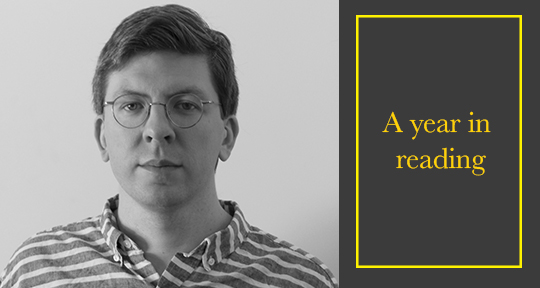Merry Christmas to those who celebrate it! This week, our staff continue to take turns looking back on 2017 through the lens of literature. Next up, Assistant Managing Editor Sam Carter.
One of the highlights of my reading year was the entirely unplanned—and unexpectedly delightful—move between translations and originals within a series not once but twice. Early in the summer, I had the chance to review the third volume of conversations between Jorge Luis Borges and Osvaldo Ferrari that Seagull Books brought out in July. Some years ago I had read in the original Spanish much of what constitutes the first two volumes in English translation, yet, for reasons I don’t quite recall, I never made it to these discussions that display a Borges who, despite being 85 years old at the time, remains a consummate conversationalist with a voracious intellectual appetite. He moves effortlessly from an unabashed Anglophilia—Joyce, Whitman, and Wilde are just some of the figures he enjoys reflecting on—to a more global concern. As he puts it in an Asymptote-appropriate formulation, “Why not accept all possible countries and cultures? Why not spread out to be cosmopolitan?”
It was with another Argentine author—cosmopolitan in his own right—that I ended up moving in the opposite direction: from translation to original. A few months before Restless Books was set to publish it in November, a friend handed me a galley of The Diaries of Emilio Renzi: Formative Years. Unwilling to wait to get my hands on a Spanish copy, I devoured it in the course of a few hours. (You can find an excerpt of this title, which was released in November, in our October 2017 issue.) There are two more volumes of these diaries, the last of which was released in Spanish in September, and I was thrilled to finish this masterful trilogy that traces the vicissitudes of the writing life with a unique intelligence and unmatched willingness to reflect on what different forms might offer. In Piglia’s view, for instance, a diary is a place where “you should ultimately write about the limits or the frontiers that make certain words or actions impossible.” He elegantly explores those limits in this record of how a great reader struggles to become a great writer by drafting versions of a novel that will only appear decades later, defining himself both with and against dominant influences, and spending what little money he has on books. The first volume is also, somewhat miraculously, both a great starting point for anyone who has yet to read any Piglia and a welcome addition to those who already familiar with much of his work.
For both Borges and Piglia, English was hardly an unfamiliar language—both translated from it and wrote about its literatures extensively—and I’d like to think that by moving between translations and originals over the course of each three-volume series I ended up with a rewarding glimpse of how each one might have produced a bilingual work. (It’s a credit to translators Anthony Edkins and Robert Croll that switching between the languages felt so seamless.) It’s an experiment I’d recommend trying at least once if you can.
The beginning of the year, however, was marked by starting a series of works that I should have begun long ago—Karl Ove Knausgaard’s My Struggle—thanks to someone who knew I needed a little nudge giving me the first volume as a gift. It was another Norwegian novelist, though, whose work ended up sticking with me: Gaute Heivoll’s Across the China Sea. Combining a prose that’s as sparsely elegant as the most sought-after Scandinavian furniture with a deeply moving reflection on what exactly constitutes a family or a community—as well as whether we should draw too sharp a distinction between them—its ideas knocked around my head for a few weeks after reading its enticing descriptions of Norwegian winters in the middle of the summer heat.
Yet just as important as remembering what I came across for the first time is recalling the books that re-entered my life once again. Most notably, 2017 marked the fifth or sixth time that I’ve worked my way through Roland Barthes’ Camera Lucida, his moving meditation on photography and the loss of his mother. Richard Howard’s expert translation captures not only the rhythms of Barthes’ prose but the unfolding of his thoughts that, although they occupy fewer than 150 pages, cover more ground than most other writers would in twice the space. A previous copy became such a palimpsest of past annotations that I bought another copy, and I have no doubt that I’ll return to it again in the years to come—or perhaps finally try to read it in French with a dictionary in hand.
Explore Sam Carter’s essay on Ricardo Piglia and his alter-ego Emilio Renzi in Public Books.
Read more reflections by staff:

